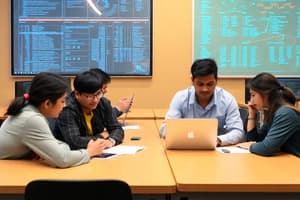Podcast
Questions and Answers
What benefits do students gain from developing the practices of science and engineering?
What benefits do students gain from developing the practices of science and engineering?
Students learn to ask better questions and improve their problem definition skills.
What tools can lower-grade students use to understand scientific and engineering models?
What tools can lower-grade students use to understand scientific and engineering models?
Lower-grade students can use pictures, diagrams, drawings, and simple physical models.
How should students differentiate between questions and engineering problems?
How should students differentiate between questions and engineering problems?
Students should recognize that questions typically seek information, while engineering problems require a solution.
What does the advancement of scientific questioning look like in upper grades?
What does the advancement of scientific questioning look like in upper grades?
Why is it important for students to evaluate scientific questions?
Why is it important for students to evaluate scientific questions?
What is a key outcome of teaching students the practices of science and engineering?
What is a key outcome of teaching students the practices of science and engineering?
Study Notes
Science and Engineering Practices
- Emphasizes understanding and application of scientific and engineering practices.
- Encourages students to know what skills they should develop and how they can be taught effectively.
Early Development of Inquiry
- Children, even before elementary school, demonstrate curiosity by asking questions about their surroundings.
- This natural inclination helps in the development of critical questioning abilities and problem definition skills.
Skill Advancement
- Cultivating scientific practices enables students to ask more insightful questions and clearly define problems.
- Students learn to differentiate between questions and problems, enhancing their analytical skills.
- In upper grades, students refine their ability to formulate scientific inquiries and define engineering challenges, focusing on data roles and problem-solving criteria.
Model Representation
- Lower grades introduce scientific and engineering models using visual aids like pictures, diagrams, and simple physical objects (e.g., toy cars, airplanes).
- As students progress, they engage with more complex representations, including simulations in upper grades.
Studying That Suits You
Use AI to generate personalized quizzes and flashcards to suit your learning preferences.
Description
This quiz delves into the essential science and engineering practices that students are expected to understand and apply. It outlines the key competencies students should develop and offers insights on effective teaching strategies. Adaptations based on the NRC framework ensure clarity and balance in the content presented.




